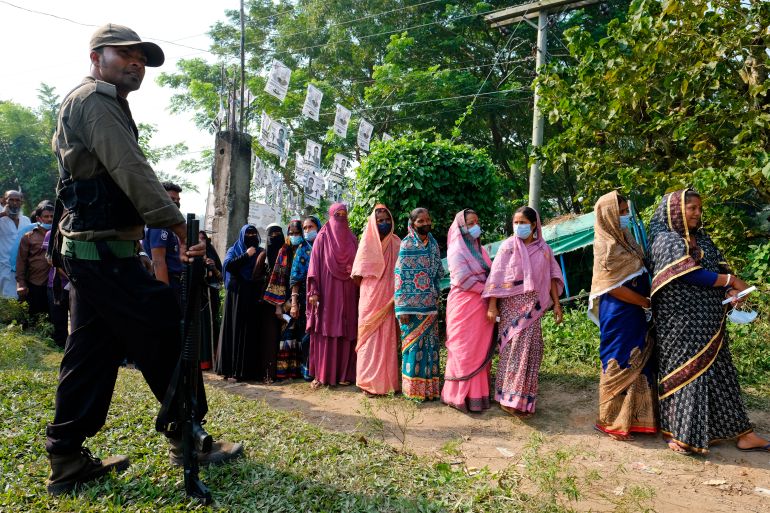Several killed in Bangladesh rural council elections amid boycott
At least seven people killed in election violence as voters elect village council representatives in vote boycotted by main opposition party.

At least seven people have been killed in Bangladesh election violence as voters selected village council representatives in elections expected to further consolidate the governing party’s power amid concerns about the state of the country’s democracy.
The largest opposition party boycotted Thursday’s vote, saying a skewed political atmosphere is preventing fair participation.
Keep reading
list of 4 itemsBangladesh sentences former chief justice to 11 years in jail
Bangladesh ruling party rallies for Hindus after deadly violence
Anger in Bangladesh over dissident writer’s death in prison
Widespread allegations of misconduct were made during the last two national elections, and political violence has marred past votes in Bangladesh, particularly for rural councils.
By late Thursday, it was not clear how many members of the ruling Awami League party had been elected to head the rural councils.
Groups used guns and spears to prevent supporters of rivals from reaching the polling booths in a village in Narsingdi district in central Bangladesh, killing three people, said Satyajit Kumar Ghosh, a senior police officer.
At least 20 other people were injured in the chaos, he said.
Another man died when rival groups clashed in southern Cox’s Bazar district, the newspaper Prothom Alo reported. Six others were injured in the area, the newspaper said.
Two people were killed in the eastern district of Cumilla and another person died in the southeastern district of Chattogram amid violence that injured many, the Daily Star newspaper reported.

Chief Election Commissioner K M Nurul Huda had warned against election violence before Thursday’s vote and said security measures were being taken to respond to any incidents.
Ahead of the vote this month, at least nine people were killed and hundreds were injured in campaign violence.
Eighty-five people have been killed and more than 6,000 injured in Bangladesh election-related violence since January, according to a Dhaka-based rights group, Ain-o-Salish Kendra.
In Thursday’s elections, more than 15 million eligible voters chose representatives on 835 councils after proceedings in some places were suspended over irregularities or violence.
A total of 4,571 councils, known as union parishads, are responsible for local community development and public welfare and are being contested in phases.
In the first phase in June, elections were held for 204 councils, with 148 candidates from the governing party winning and independents taking the rest.
Analysts said Thursday’s election is an opportunity for the ruling Awami League party of Prime Minister Sheikh Hasina to consolidate its position ahead of the next general election scheduled for 2023.
Her party won by a landslide in the last two general elections in 2014 and 2018, both of which were marred by allegations of vote-rigging and manipulation.
From 1991, when Bangladesh returned to a democratic system, to the 2008 election, Hasina and her archrival, former Prime Minister Khaleda Zia of the main opposition Bangladesh Nationalist Party, alternately ruled the country.
Hasina’s overwhelming win in 2008 was the most recent national election that was accepted as free and fair. Zia’s party has boycotted several of the elections since.